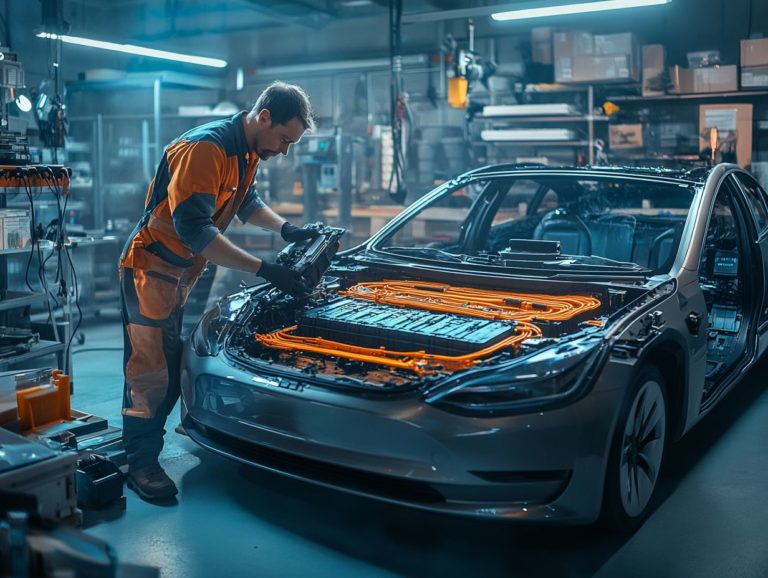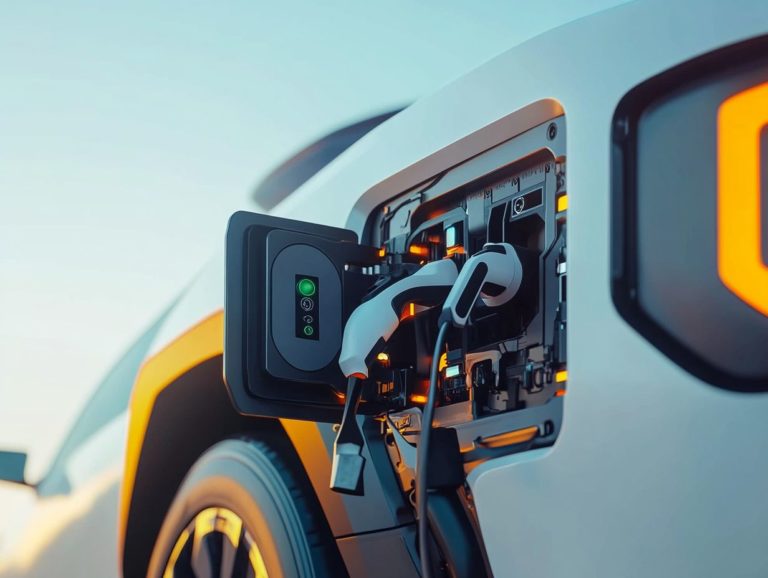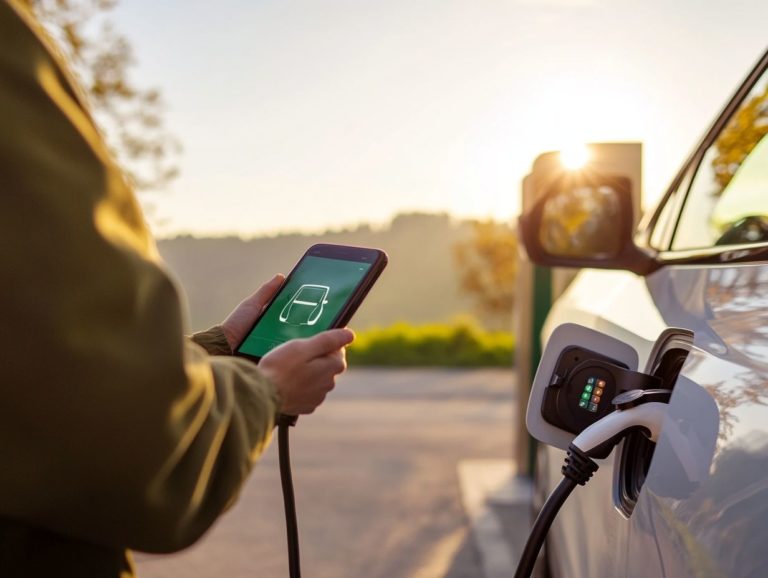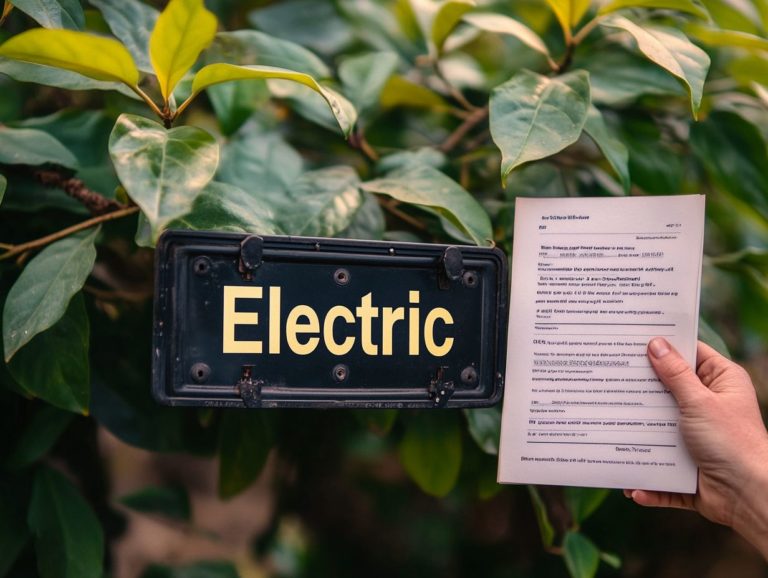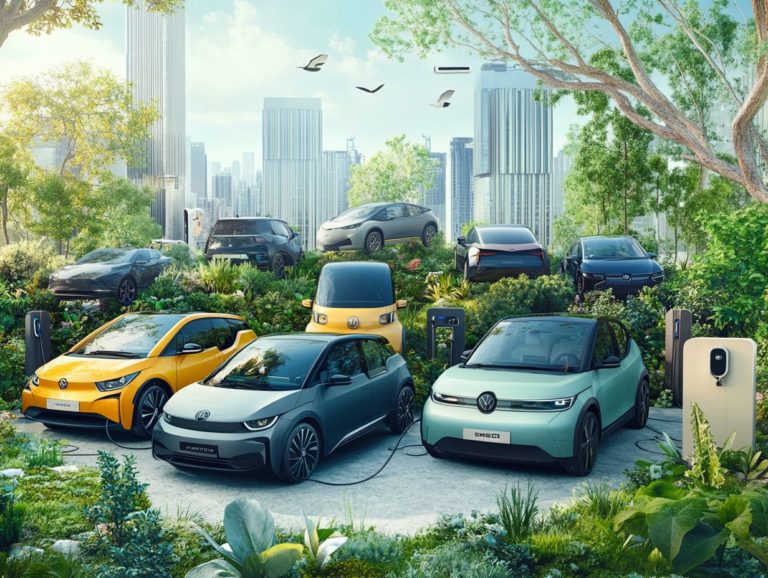what are the top electric vehicle myths?
Electric vehicles (EVs) are rapidly becoming the go-to choice for eco-conscious drivers, yet misconceptions still linger around their reputation.
This article delves into some of the most prevalent myths about EVs, tackling everything from their cost and range to their environmental impact and performance compared to traditional gasoline vehicles.
You ll also find helpful tips on selecting the right EV for your lifestyle. Get ready to arm yourself with essential facts!
Contents
- Key Takeaways:
- Debunking Common Myths
- Benefits of Electric Vehicles
- How to Choose the Right Electric Vehicle for You
- Frequently Asked Questions
- What are the top electric vehicle myths?
- Do electric vehicles have a limited driving range?
- Why should I choose an electric vehicle today?
- Are electric vehicles more expensive than traditional vehicles?
- Are electric vehicles not as safe as gas-powered cars?
- Do electric vehicles take a long time to charge?
- Are electric vehicles only good for short city drives?
Key Takeaways:
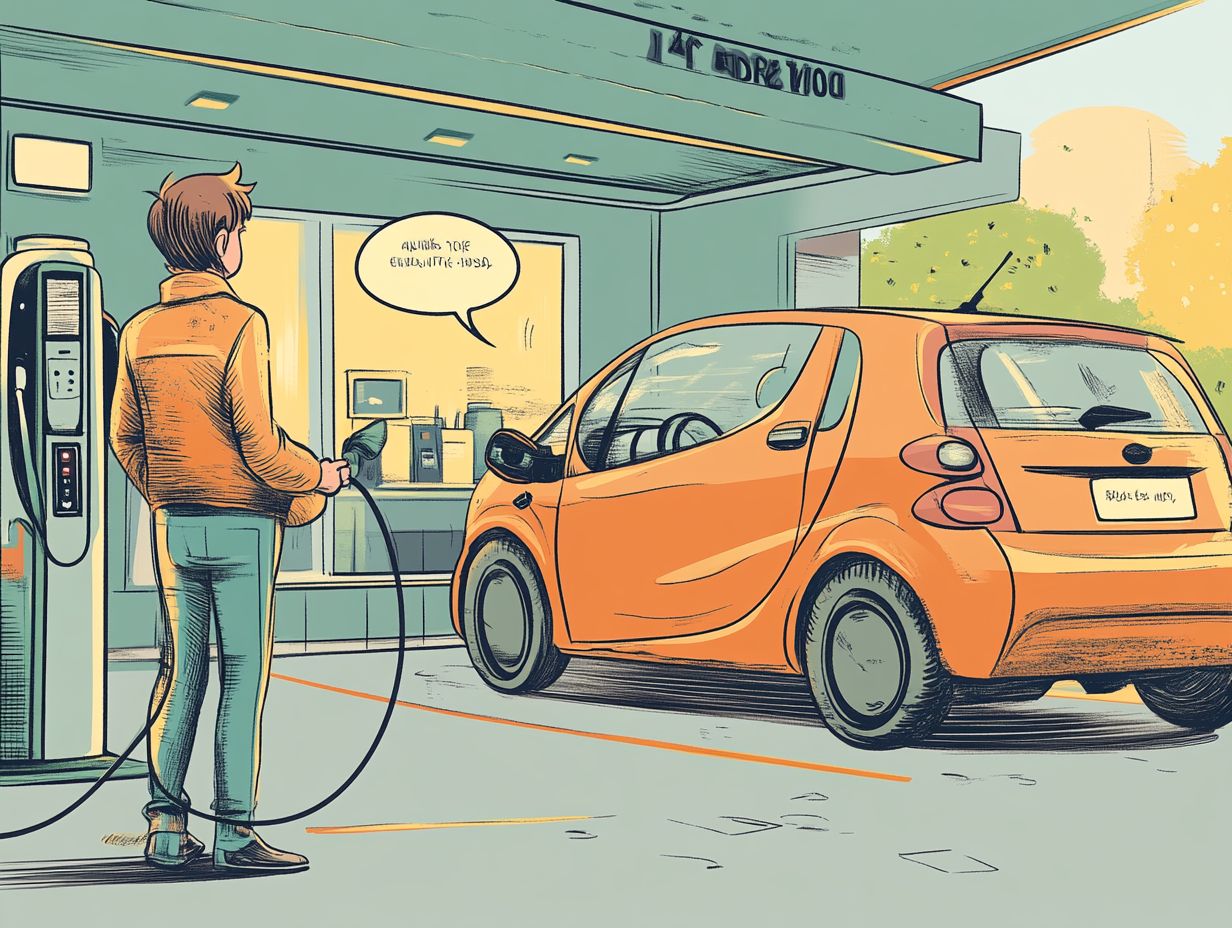
Electric vehicles are often perceived as more expensive, but with government incentives and increasing availability, they are becoming more affordable.
Despite misconceptions, electric vehicles have a range comparable to gasoline vehicles and can even travel longer distances with advancements in technology.
Contrary to popular belief, electric vehicles have a significant positive impact on the environment, reducing carbon emissions and promoting sustainability.
Understanding these points can help you make smarter choices about going electric.
What are Electric Vehicles?
Electric vehicles (EVs) signify a remarkable evolution in the automotive landscape. They offer a compelling alternative to traditional gasoline engines by leveraging the capabilities of electricity.
This transition is crucial for cutting down carbon emissions and championing sustainability while tapping into renewable energy sources to fuel your journeys.
When you choose an EV, you help fight climate change, boost energy efficiency, and support cleaner public transport systems in regions like the UK and California.
These eco-friendly options primarily encompass battery electric vehicles (BEVs) and plug-in hybrid electric vehicles (PHEVs). They are designed with advanced components such as electric motors, batteries, and regenerative braking systems.
Unlike gasoline-fueled vehicles, EVs deliver a whisper-quiet performance and instant torque, transforming your driving experience into something truly exceptional.
The importance of reducing carbon emissions is paramount. Transportation contributes significantly to global greenhouse gas emissions.
By integrating renewable energy sources such as solar and wind into their charging infrastructure, the environmental advantages of electric vehicles are significantly amplified. This paves the way for a sustainable future.
As cities and communities increasingly adopt this technology, the connection between reduced energy consumption and enhanced sustainability becomes strikingly evident.
Debunking Common Myths
As electric vehicles (EVs) become increasingly popular, you might hear some surprising myths that could mislead you as a potential buyer.
These misconceptions often focus on the total cost of ownership, charging infrastructure, and overall performance. Grasping the truth behind these myths is essential for you to make informed decisions and fully embrace the transition to sustainable transportation.
Myth #1: Electric Vehicles are More Expensive
A common misconception is that electric vehicles are inherently more expensive than their gasoline counterparts, primarily due to their initial purchase price. However, when you look closely at the total cost of ownership, including maintenance costs and government incentives, you might find that EVs can actually be more economical over time.
This viewpoint transforms significantly when you assess the comprehensive savings associated with electric vehicles.
Beyond the upfront cost, you ll enjoy considerably lower maintenance expenses. This is thanks to fewer moving parts and less frequent servicing compared to traditional gasoline vehicles.
Charging at home can lead to substantial fuel savings. Often, this results in costs that are much lower than what you d pay for gasoline.
Additionally, various government incentives, such as tax credits or rebates, make the transition to EVs financially appealing. These incentives often help to balance out those higher initial costs.
When you weigh these factors against traditional vehicles, the long-term economic benefits of electric vehicles become crystal clear, reshaping how you view their affordability.
Myth #2: Do Electric Vehicles Really Have Limited Range?
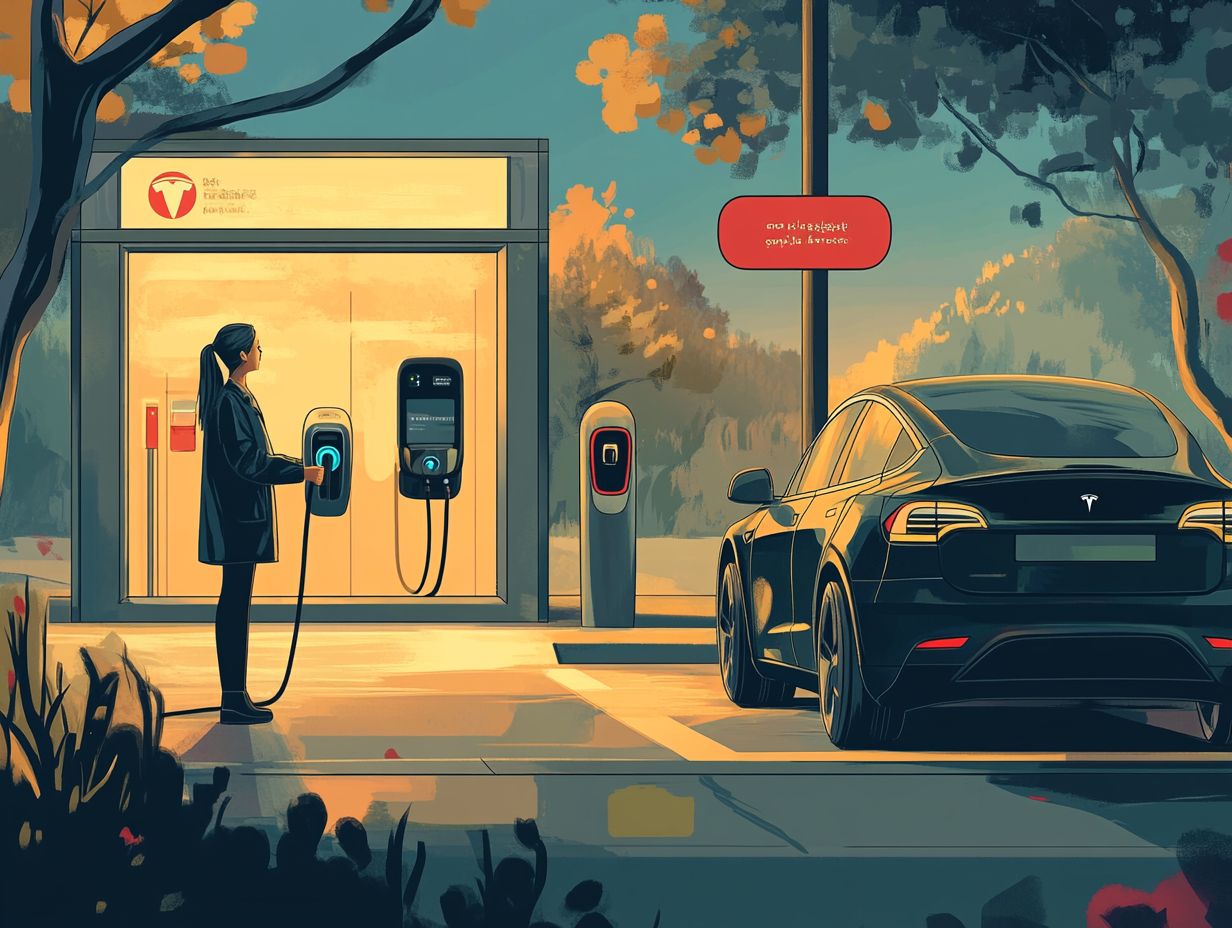
The myth of limited range in electric vehicles often stirs up worries about running out of battery for potential buyers. However, thanks to remarkable advancements in battery technology, modern EVs are improving in driving range.
This makes them suitable for daily commutes and long-distance travel.
But the progress doesn t stop at batteries. Enhanced charging speeds allow for quicker top-ups, easing concerns about finding a place to recharge.
As the network of charging stations continues to grow, you ll discover it s becoming increasingly effortless to locate convenient charging points, creating a more reassuring environment for would-be EV owners.
Renewable energy sources are now integrated into these charging stations, elevating the sustainability factor of electric vehicles while promoting their adoption in both urban and rural settings.
This fusion of technology and accessibility is revolutionizing personal transportation, paving the way for a greener future.
Myth #3: Are Electric Vehicles Really Not Environmentally Friendly?
Actually, the truth is exciting! Despite the common belief that electric vehicles may not be as environmentally friendly as they seem, they provide substantial environmental benefits.
By dramatically reducing greenhouse gas emissions, electric vehicles play a key role in combating climate change, especially when charged using renewable energy sources.
When you take a closer look at the lifecycle of electric vehicles, it becomes evident that their carbon footprint is significantly lower than that of traditional gasoline-powered vehicles.
You might think that producing EV batteries is a dirty process, but advancements in technology and recycling methods have greatly lessened these impacts.
As the energy grid moves toward more sustainable sources, the positive effects of electric vehicles on air quality and global warming become even more pronounced.
Ultimately, embracing electric vehicles isn t just about making a choice; it represents a strong commitment to sustainability and encourages a shift toward a more eco-conscious approach to transportation.
Myth #4: Are Electric Vehicles Really Not as Powerful as Gasoline Vehicles?
One of the most deceptive myths out there is that electric vehicles lack the power and performance found in gasoline-powered cars. In reality, contemporary EVs are equipped with robust electric motors that deliver immediate power.
Take Tesla, for example. They have completely redefined expectations, with models that can accelerate from 0 to 60 mph in mere seconds, rivaling even the most high-performance sports cars.
On the other hand, Volvo’s electric offerings leverage advanced technology to provide drivers with a ride that s both smooth and exhilarating, highlighted by impressive torque delivery.
When you compare these capabilities to those of internal combustion engines, it becomes clear that EVs can not only match but frequently surpass the performance benchmarks set by their gasoline counterparts.
This makes them an increasingly compelling choice for those who prioritize performance.
Benefits of Electric Vehicles
Electric vehicles (EVs) provide a wealth of advantages that go beyond mere environmental concerns.
They deliver substantial cost savings and enhanced energy efficiency, making them an enticing option for both consumers and businesses.
Don t miss out on the future of transportation; embrace electric vehicles today!
Environmental Impact
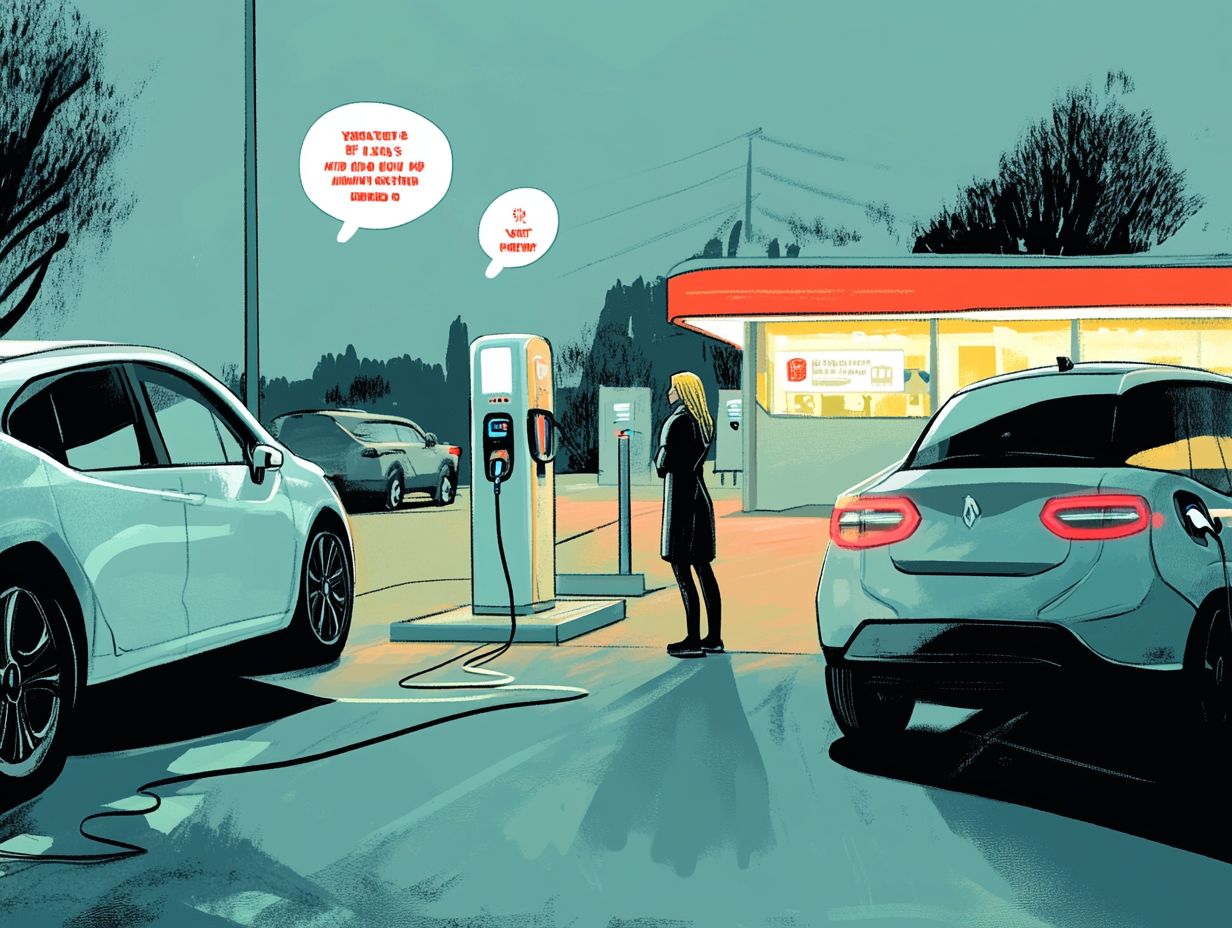
The environmental impact of electric vehicles is incredibly positive. They reduce greenhouse gas emissions drastically compared to traditional gasoline cars.
This big drop in emissions plays a crucial role in the fight against climate change. It also fosters the adoption of renewable technologies!
By switching to electric transportation, you and your community can significantly lower carbon footprints. This shift helps mitigate the harmful effects of fossil fuels and supports renewable energy sources like solar and wind!
When you recharge electric vehicles with clean energy, you boost the sustainability of transportation systems. As society embraces these innovations, we can achieve global sustainability goals, paving the way for a cleaner, healthier planet.
Electric vehicles symbolize a vital advancement in our effort to combat climate change.
Cost Savings
Cost savings are a primary advantage of electric vehicles! They typically have lower maintenance costs and benefit from a more affordable, efficient charging infrastructure compared to gasoline vehicles.
This leads to a more favorable total cost of ownership. By eliminating the need for oil changes and reducing wear on moving parts, electric vehicles significantly lower your routine maintenance expenses.
You can also enjoy substantial savings on fuel costs since charging is often less expensive than filling up a gas tank.
In many regions, government incentives enhance the financial appeal of making the switch. Tax credits and rebates can make a noticeable difference!
When you compare these benefits with traditional internal combustion engine vehicles, the cumulative effect of these savings can leave thousands of dollars in your pocket over the lifespan of the car.
This makes electric vehicles not just an eco-friendly choice but an economically compelling one as well!
How to Choose the Right Electric Vehicle for You
Selecting the ideal electric vehicle requires thoughtful consideration of factors like charging speeds, battery life, and overall energy efficiency.
This evaluation ensures that you choose an EV that aligns perfectly with your lifestyle and driving needs.
Factors to Consider
When considering an electric vehicle, evaluate key factors such as charging infrastructure, total cost of ownership, range anxiety, and battery life. This assessment empowers you to make an informed decision tailored to your needs.
The landscape of electric vehicle ownership is evolving rapidly. Understanding how these elements intersect affects your satisfaction and convenience.
Access to public charging points is crucial! It eases worries about running out of battery during daily commutes or long journeys.
Charging speeds are another critical consideration, as they directly influence how well an electric vehicle fits into your busy lifestyle.
Quick charging stations allow for efficient top-ups, minimizing wait times and seamlessly integrating into your routine. By exploring these criteria, you can better align your choices with your personal requirements and broader environmental objectives.
Frequently Asked Questions

What are the top electric vehicle myths?
Some common myths about electric vehicles include that they have limited driving range, are more expensive than traditional vehicles, and are not as safe as gas-powered cars.
Do electric vehicles have a limited driving range?
No, this is a common misconception! Many electric vehicles on the market today have a range of over 200 miles on a single charge, with some even exceeding 300 miles. This is more than enough for most daily commutes and road trips.
Why should I choose an electric vehicle today?
Making the switch to electric vehicles is not only good for the environment, but it can also save you money in the long run!
Are electric vehicles more expensive than traditional vehicles?
The initial cost of an electric vehicle may be higher than that of a gas-powered car. However, over time, ownership costs can actually be lower due to reduced maintenance and fuel expenses.
There are also tax incentives and rebates that can reduce the overall cost of buying an electric vehicle.
Are electric vehicles not as safe as gas-powered cars?
This is a common misunderstanding. In fact, electric vehicles can be safer because their batteries provide a lower center of gravity, making them more stable on the road.
They also come with advanced safety features. For example, regenerative braking helps slow down the car by converting motion into energy, and electronic stability control helps keep the vehicle steady.
Do electric vehicles take a long time to charge?
Charging an electric vehicle does take longer than filling up a gas tank. However, most charging happens at home when the car is not in use.
Thanks to technological advancements, fast-charging stations are becoming more common, significantly reducing charging times!
Are electric vehicles only good for short city drives?
No way! Electric vehicles are perfect for both city and highway driving.
Many models now offer ranges over 200 miles, making them great for longer trips. Plus, public charging stations are becoming more available, giving you plenty of options for recharging on the go.

